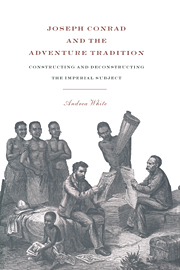Book contents
- Frontmatter
- Contents
- Acknowledgments
- Introduction
- 1 Constructing the imperial subject: nineteenth-century travel writing
- 2 Adventure fiction: a special case
- 3 Them and us: a useful and appealing fiction
- 4 The shift toward subversion: the case of H. Rider Haggard
- 5 Travel writing and adventure fiction as shaping discourses for Conrad
- 6 Almayer's Folly
- 7 An Outcast of the Islands
- 8 The African fictions (I): “An Outpost of Progress”
- 9 The African fictions (II): “Heart of Darkness”
- Coda
- Notes
- Bibliography
- Index
- Frontmatter
- Contents
- Acknowledgments
- Introduction
- 1 Constructing the imperial subject: nineteenth-century travel writing
- 2 Adventure fiction: a special case
- 3 Them and us: a useful and appealing fiction
- 4 The shift toward subversion: the case of H. Rider Haggard
- 5 Travel writing and adventure fiction as shaping discourses for Conrad
- 6 Almayer's Folly
- 7 An Outcast of the Islands
- 8 The African fictions (I): “An Outpost of Progress”
- 9 The African fictions (II): “Heart of Darkness”
- Coda
- Notes
- Bibliography
- Index
Summary
When F. R. Leavis, one of the early rescuers of Joseph Conrad's then uncertain literary reputation, included that writer in his “Great Tradition” in 1948, he saved Conrad from the “infernal tail of ships” Conrad claimed followed him (Jean-Aubrey, Conrad, II, p. 316). In doing so, he privileged Conrad's more obviously modernist productions, thus securing for the Polish sailor a place in the academy. As a result, Leavis, the academy, and the anthologies gave short shrift to the early works and consigned them to an easily forgotten shelf marked “apprentice fiction,” as though they were maverick, somehow, and therefore of little significance. However, ideas intrinsic to those early works pertain throughout Conrad's work. The books are especially significant in their pivotal attitudes towards the subject of empire.
Reading Conrad only in Leavis' “great” tradition would not only silence the early work, but also necessitate a particular point of view, one that places Conrad in the established mainstream of English novelists. Leavis admits that Conrad “brought a great deal from outside”, and goes on to assert, rather vaguely, that, nonetheless,
it was of the utmost importance to him that he found a serious art of fiction there in English, and that there were, in English, great novelists to study. He drew from English literature what he needed, and learnt in that peculiar way of genius which is so different from imitation. And for us, who have him as well as the others, there he is, unquestionably a constitutive part of the tradition, belonging in the full sense.
(The Great Tradition, p. 18)- Type
- Chapter
- Information
- Joseph Conrad and the Adventure Tradition , pp. 1 - 7Publisher: Cambridge University PressPrint publication year: 1993



